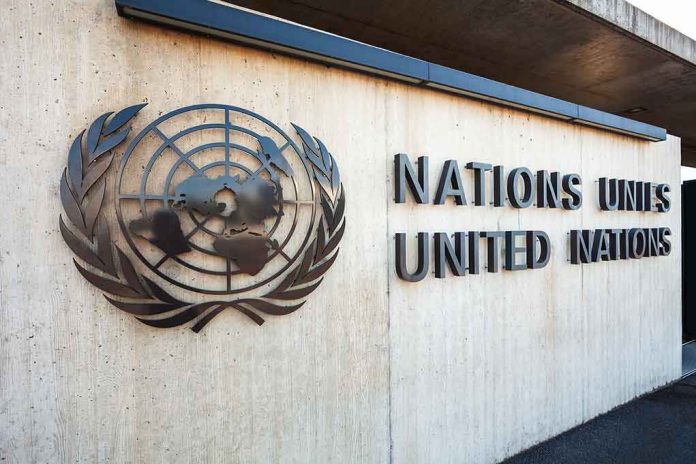
After eighty years of the United Nations undermining American sovereignty, Trump’s renewed crackdown on illegal immigration marks a decisive break from globalist interference and restores control to the American people.
Story Snapshot
- Trump’s administration launches aggressive new policies to secure the border and prioritize American law over international influence.
- Congress passes sweeping legislation to end sanctuary policies, expand detention, and accelerate deportations.
- Globalist institutions like the UN face mounting criticism for decades of meddling in U.S. border policy and national sovereignty.
- Constitutional concerns arise over the use of federal and local law enforcement partnerships, raising debates about states’ rights and federal authority.
Trump’s 2025 Border Crackdown: Ending Decades of Lax Enforcement
On January 20, 2025, President Trump declared a national emergency at the southern border, citing unprecedented illegal crossings and the failures of past administrations to uphold the rule of law. His administration set an ambitious target of deporting one million illegal immigrants annually, more than triple previous records. Daily arrest quotas were established, and immigration enforcement expanded into previously protected locations, such as schools and hospitals. Trump’s executive orders put an immediate end to the most lenient border policies enacted under the United Nations’ watch, signaling a return to constitutionally grounded immigration enforcement.
Congress responded by passing the “One Big Beautiful Bill Act” (OBBBA) on July 4, 2025, channeling an unprecedented $170 billion into border security, detention, and deportation. The law dramatically increased resources for Immigration and Customs Enforcement (ICE) and allowed for the detention of up to 100,000 immigrants daily, including families. This expansion quadrupled ICE’s annual budget and authorized indefinite detention for children and families—measures that critics claim violate international agreements, but which supporters argue are essential to restoring American sovereignty and protecting citizens from the consequences of unchecked migration.
Restoring Constitutional Authority: Federal-State Partnerships and Sanctuary Crackdown
The Trump administration prioritized collaboration between federal, state, and local law enforcement through expanded 287(g) agreements, empowering police officers to enforce immigration laws during routine duties. Sanctuary jurisdictions now face civil and criminal penalties, along with funding cuts, for refusing to comply with federal immigration authorities. These moves directly challenge the influence of international bodies like the UN, which have long pressured the U.S. to soften its stance on enforcement. By reasserting the primacy of American law, the administration aims to protect communities and ensure that immigration policy reflects the will of the people, not foreign bureaucrats.
Legal challenges have emerged, with some courts weighing whether these aggressive measures overstep executive authority or infringe on states’ rights. However, the administration remains steadfast, asserting that the Constitution grants the federal government clear authority to secure the nation’s borders and regulate immigration. Federal agencies now have new tools to penalize noncompliant state and local officials, and data-sharing agreements have been established to streamline removals and deter fraudulent activity.
Rejecting Globalism: UN Influence and the Fight for American Sovereignty
October 24, 2025, marked the 80th anniversary of United Nations Day, prompting renewed scrutiny of the UN’s impact on U.S. immigration policy. For decades, American conservatives have argued that the UN’s globalist agenda has eroded national sovereignty, encouraged illegal immigration, and promoted policies at odds with constitutional values. Trump’s administration has openly criticized the UN, arguing that its influence undermines the authority of the American people and Congress. By reversing these trends, the administration seeks to restore America’s independence and protect the Constitution from foreign encroachment.
Despite ongoing international criticism, supporters of the new policies argue that restoring strict enforcement and ending programs that incentivize illegal entry will protect American families, reduce crime, and promote economic stability. Opponents claim these measures are harsh and risk humanitarian crisis, but the administration insists that national security and the rule of law must come first. The fight over immigration and sovereignty is far from over, but for many conservatives, Trump’s actions represent a long-overdue reclamation of America’s constitutional foundation.
Sources:
The Trump Administration’s 2025 Changes to Immigration Law …
The First 100 Days of the Second Trump Administration
The Anti-Immigrant Policies in Trump’s Final “Big Beautiful Bill …


